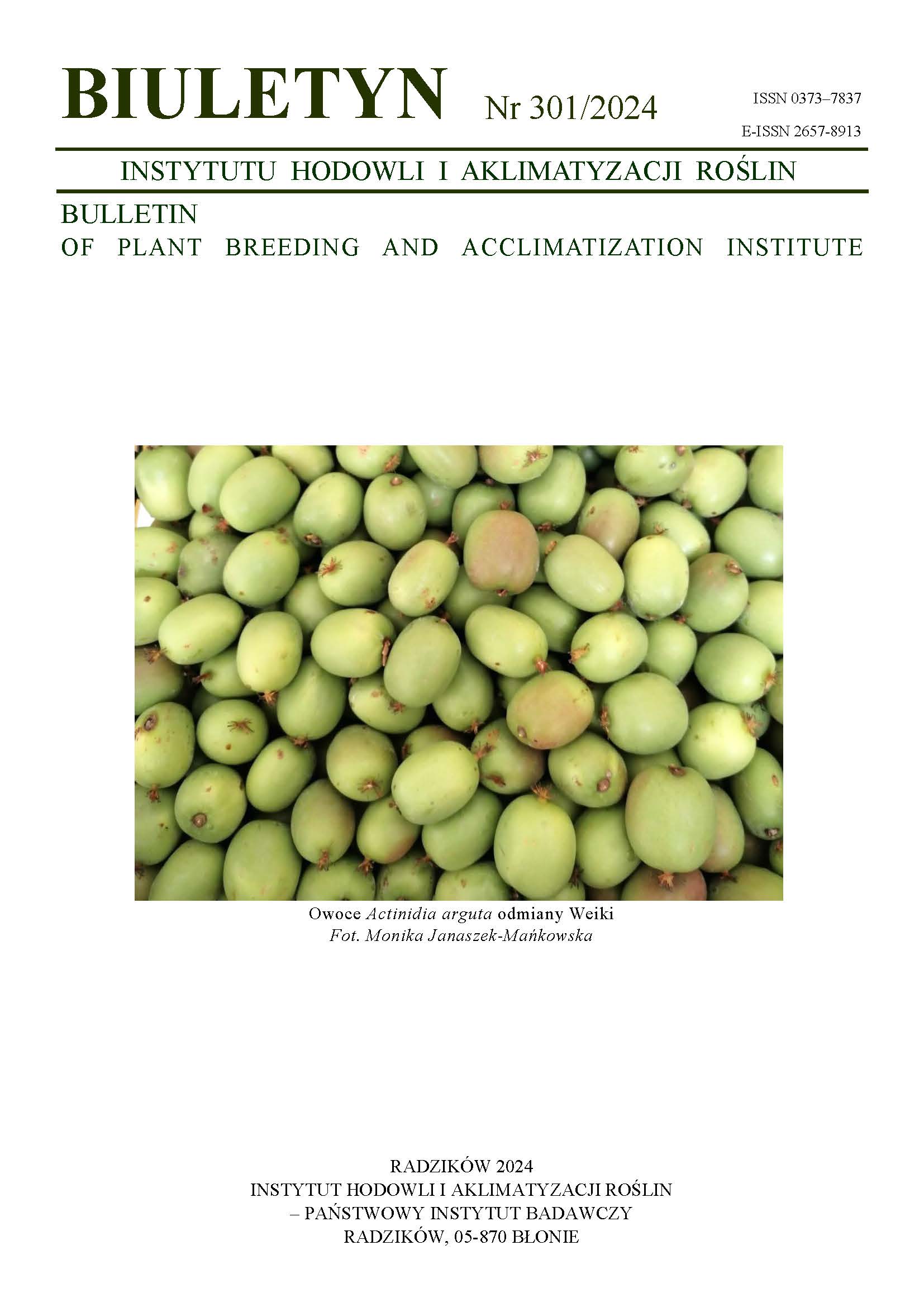Identification of new sources of resistance for ear rot and stalk rot diseases caused by Fusarium spp.
Elżbieta Czembor
e.czembor@ihar.edu.plInstytut Hodowli i Aklimatyzacji Roślin — Państwowy Instytut Badawczy, Radzików (Poland)
Seweryn Frasiński
Instytut Hodowli i Aklimatyzacji Roślin — Państwowy Instytut Badawczy, Radzików (Poland)
Supporting Agencies
Keywords:
Fusarium graminearum, fuzarioza kolb, kukurydza, deoksyniwalenol, zgorzel podstawy łodygi, źródła odpornościReferences
Czembor E., Frasiński S. 2018. Polskie elitarne linie wsobne kukurydzy źródłem odporności na fuzariozę kolb (Fusarium spp.) i głownię guzowatą (Ustilago maydis). Prog. Plant Prot. 58: 22 — 27.
Google Scholar
Czembor E., Frasiński S., Stępień Ł. 2018. Reakcja genotypów kukurydzy na infekcję wybranymi izolatami grzybów z rodzaju Fusarium sekcji Liseola. Response of maize genotypes to the infection by selected Fusarium isolates from Liseola section. Prog. Plant Prot. 58: 81 — 86.
Google Scholar
Czembor E., Stępień Ł., Waśkiewicz A. 2015. Effect of environmental factors on Fusarium species and associated mycotoxins in maize grain grown in Poland. PLOSONE http://journals.plos.org/plosone/article?id=10.1371/journal.pone.0133644.
Google Scholar
Czembor E., Matusiak M., Warzecha R. 2013. Poszukiwanie źródeł odporności kukurydzy na fuzariozę kolb i zgorzel podstawy łodyg metodą rodowodową. Biul. IHAR 269: 131 — 139.
Google Scholar
Vasileiadis V. P., Otto S., Sattin M., Palinkás Z., Veres A., Bán R. Kiss J., Pons X., Kudsk P., Weide R., Czembor E., Moonen C., Kiss J. 2011. Crop protection in European maize-based cropping systems: Current practices and recommendations for innovative Integrated Pest Management. Agricultural Systems 104: 533 — 540.
Google Scholar
Zijlstra C., Lund I., Justesen A., Nicolaisen M., Bianciotto V., Posta K., Balestrini R., Przetakiewicz A., Czembor E., van de Zande J. 2011. Combining novel monitoring tools and precision application technologies for integrated high-tech crop protection in the future (a discussion document). Pest Manag. Sci. 67: 616 — 625.
Google Scholar
Authors
Elżbieta Czembore.czembor@ihar.edu.pl
Instytut Hodowli i Aklimatyzacji Roślin — Państwowy Instytut Badawczy, Radzików Poland
Authors
Seweryn FrasińskiInstytut Hodowli i Aklimatyzacji Roślin — Państwowy Instytut Badawczy, Radzików Poland
Statistics
Abstract views: 176PDF downloads: 188
License

This work is licensed under a Creative Commons Attribution-ShareAlike 4.0 International License.
Upon submitting the article, the Authors grant the Publisher a non-exclusive and free license to use the article for an indefinite period of time throughout the world in the following fields of use:
- Production and reproduction of copies of the article using a specific technique, including printing and digital technology.
- Placing on the market, lending or renting the original or copies of the article.
- Public performance, exhibition, display, reproduction, broadcasting and re-broadcasting, as well as making the article publicly available in such a way that everyone can access it at a place and time of their choice.
- Including the article in a collective work.
- Uploading an article in electronic form to electronic platforms or otherwise introducing an article in electronic form to the Internet or other network.
- Dissemination of the article in electronic form on the Internet or other network, in collective work as well as independently.
- Making the article available in an electronic version in such a way that everyone can access it at a place and time of their choice, in particular via the Internet.
Authors by sending a request for publication:
- They consent to the publication of the article in the journal,
- They agree to give the publication a DOI (Digital Object Identifier),
- They undertake to comply with the publishing house's code of ethics in accordance with the guidelines of the Committee on Publication Ethics (COPE), (http://ihar.edu.pl/biblioteka_i_wydawnictwa.php),
- They consent to the articles being made available in electronic form under the CC BY-SA 4.0 license, in open access,
- They agree to send article metadata to commercial and non-commercial journal indexing databases.
Most read articles by the same author(s)
- Elżbieta Czembor, Seweryn Frasiński, Monitoring Ustilago maydis population causing common smut of maize in Poland between 2016 - 2019 , Bulletin of Plant Breeding and Acclimatization Institute: No. 293 (2020): Special issue
- Seweryn Frasiński, Elżbieta Czembor, Justyna Lalak-Kańczugowska, The impact of fusarium ear rot in Poland and methods to reduce losses caused by the disease , Bulletin of Plant Breeding and Acclimatization Institute: No. 290 (2020): Special issue
- Jerzy H. Czembor, Elżbieta Czembor, Aneta Kisiela, Elżbieta Wnuk, Resistance to powdery mildew (Blumeria graminis f.sp. hordei) of spring barley varieties covered by the Post-registration Variety Testing Program in 2022 , Bulletin of Plant Breeding and Acclimatization Institute: No. 299 (2023): Regular issue
- Elżbieta Czembor, Magdalena Matusiak, Roman Warzecha, Looking for sources of resistance to ear rot and stalk rot on the basis of the pedigree selection , Bulletin of Plant Breeding and Acclimatization Institute: No. 269 (2013): Regular issue
- Elżbieta Czembor, Agronomic value of European cultivars of perennial ryegrass (Lolium perenne L.) in the Polish conditions , Bulletin of Plant Breeding and Acclimatization Institute: No. 245 (2007): Regular issue
- Elżbieta Czembor, Włodzimierz Majtkowski, Jan Schmidt, Seweryn Frasiński, Damian Marciniak, Creation perennial grasses ecotypes collection and evaluation their suitability for the special purposes , Bulletin of Plant Breeding and Acclimatization Institute: No. 286 (2019): Special issue
- Elżbieta Czembor, Characteristic of Italian ryegrass and hybrid ryegrass cultivars and breeding materials with special emphasis on crown rust and snow mould resistance , Bulletin of Plant Breeding and Acclimatization Institute: No. 245 (2007): Regular issue
- Elżbieta Czembor, Effects of organic fertilization on agronomic traits of perennial grass species recommended for conventional and low input farming , Bulletin of Plant Breeding and Acclimatization Institute: No. 270 (2013): Regular issue
- Elżbieta Czembor, Magdalena Matusiak, Piotr Ochodzki, Resistance of maize hybrids to ear rot caused by Fusarium graminearum and F. verticillioides in Poland in years 2008–2009 , Bulletin of Plant Breeding and Acclimatization Institute: No. 270 (2013): Regular issue
- Elżbieta Czembor, Magdalena Matusiak, Kinetics of red ear rot of maize caused by Fusarium graminearum and deoxynivalenol accumulation in the grain , Bulletin of Plant Breeding and Acclimatization Institute: No. 274 (2014): Regular issue













